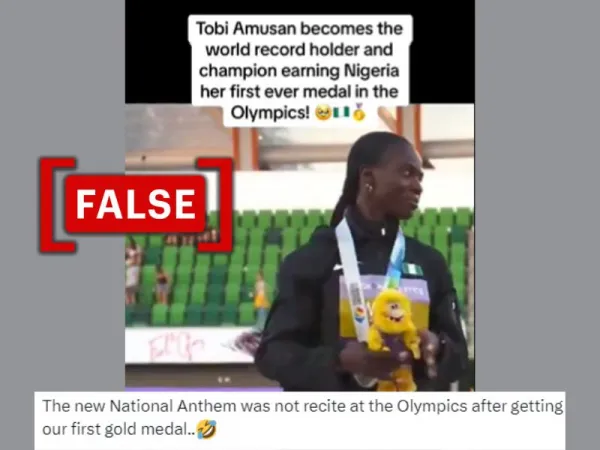By: Rajini KG
August 5 2024
 Screenshot of the social media post which claims new National Anthem was not played after sprinter Tobi Amusan won gold in 2024 Olympics. (Source: X/Modified by Logically Facts)
Screenshot of the social media post which claims new National Anthem was not played after sprinter Tobi Amusan won gold in 2024 Olympics. (Source: X/Modified by Logically Facts)
The video is from the 2022 World Athletic Championship, and the new anthem was introduced in May 2024.
What’s being claimed?
A video of a medal ceremony is being shared with the claim that Nigeria's new national anthem was not played at the 2024 Olympics in France after sprinter Tobi Amusan won the first gold medal for the country. An X (formerly Twitter) user shared the video with the caption, “The new National Anthem was not recite [sic] at the Olympics after getting our first gold medal...”
The text on the video reads, "Tobi Amusan becomes the world record holder and champion earning Nigeria her first ever medal in the Olympics!" The video shows Amusan standing on the podium and being awarded a gold medal. The post received 70,000 views. This video was also shared on Facebook (archived here).
Screenshot of the video shared online. (Source: X/Facebook/Modified by Logically Facts)
However, the video is old. It was filmed at the 2022 World Athletic Championships, not the 2024 Paris Olympics. Nigeria's new national anthem was introduced in May 2024.
Here are the facts
At the 2:04 mark of the video, Amusan can be seen holding a giant check, representing the USD 100,000 cash prize, dated "24-07-22." The check also shows the text "World Athletics Championships Oregon 22."
Screenshot of the viral video. (Source: X)
A Google search led us to the Facebook page of Peter Obi, former Governor of Anambra State in Nigeria, where we found the same video (archived here) uploaded on July 25, 2022. The video was captioned: “#worldAthleticChamps I sincerely congratulate Tobi Amusan on winning the 100M hurdles gold medal and setting a world record. Her tears at the ceremony podium while the Nigerian anthem played, connects that our dear country needs leaders to match the talents and ambitions of her youths.”
Screenshot of Peter Obi's Facebook Post. (Source: Facebook)
The World Athletics Championships website (archived here) states that in the World Athletics Championships Oregon 22 semifinals held on July 24, 2022, Amusan broke the world record with a time of 12.12 seconds, shearing 0.08 seconds off the previous record from 2016, which was set by U.S. athlete Kendra Harrison.
The Women's 100m hurdles competition has not yet taken place at the Paris Olympics, and will be held from August 7 to August 10, 2024.
Nigeria’s new national anthem
President Bola Tinubu signed the National Anthem Bill 2024 on May 29, 2024, officially reverting Nigeria’s national anthem to “Nigeria, we hail thee/Our own dear native land.” According to a BBC report, "Nigeria, we hail thee," written in 1959 by Lillian Jean Williams and composed by Frances Berda, was dropped as the national anthem by the erstwhile military government in 1978. Nigeria’s national anthem from 1978 to 2024 was “Arise, O Compatriots/Nigeria’s call obey,” as seen on the Nigerian Ministry of Foreign Affairs website on August 5, 2024.
As of August 5, 2024, Nigeria has not won any medals in 2024 Paris Olympics.
The verdict
A two-year-old video of Tobi Amusan's medal ceremony from the 2022 World Athletics Championship has been shared with the false claim that Nigeria's current national anthem was not played at the 2024 Paris Olympics. The national anthem of Nigeria was changed in 2024, not in 2022, and Nigeria is yet to win a medal at the Games.